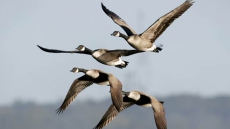OTTAWA - Russia is responding to fresh sanctions from Canada, the U.S. and other countries with a ban on food imports for a year, as well as threatening airspace retaliation.
Russian Prime Minister Dmitry Medvedev says the ban covers meat, fish, milk and milk products and fruit and vegetables from Canada, the U.S., the European Union, Australia and Norway.
"For a long time, Russia has not responded to the so-called sanctions declared against it by certain countries," Medvedev told a government meeting.
"Until the last moment, we hoped that our foreign colleagues would realize that sanctions lead to a blind alley, and that no one benefits from them. But they didn't realize this, and now we have been forced to respond."
The move comes a day after Canada slapped new sanctions and travel bans on several top Russian and Ukrainian politicians and groups with ties to Putin's government.
In Canada, pork producers are expected to take the biggest hit from the Russian sanctions. Canada's agricultural exports to Russia amounted to $563 million in 2012, according to Agriculture and Agri-Food Canada, mostly from frozen pork.
Canada's latest sanctions against Russia, imposed in tandem with the U.S. and the EU, came amid reports the Russians are amassing thousands of troops along the Ukrainian border.
Russian President Vladimir Putin retaliated by ordering authorities to draft a list of agricultural products from countries that have imposed sanctions on Russia.
Medvedev said Russia is also considering banning Western carriers from flying over Russia on flights to and from Asia — a move that would significantly hike costs and increase flight time. He said a decision on that hasn't been made yet.
"I'd like to emphasize that all these measures are not being introduced yet, but otherwise can be implemented either separately or together. As a result, the expenses of Western airlines will grow significantly," he said.
Industry Minister James Moore said the world needs to continue to "stand firm" against Russia, despite the escalation of sanctions.
While the government will assess how seriously the sanctions could impact the Canadian economy, "we will not be intimidated by these kinds of tactics," Moore said in Montreal.
Nonetheless, the Russian measures are likely to pose major problems for pork producers.
"It becomes a huge concern for producers, because any time pork product backs up at the packers, that generally relates to a lower price paid to producers," said Karl Kynoch, chairman of the Manitoba Pork Council.
"Hopefully, with the good relationships that our packers have with other countries, they can ... redirect the pork product into other good markets sooner rather than later."
The trade deal with the European Union could help ease the sting, he added.
"Trying to move agreements forward in the EU is very positive. The other positive thing is that Canada exports to about 80 some countries. Some of those are very small, but we do have access to a lot of other markets."
Medvedev said Russia could also introduce restrictions regarding imports of planes, navy vessels and cars, but added that the government will realistically assess its own production potential.
Helicopters, airplanes and spacecraft are No. 2 on the list of top Canadian exports to Russia, according to Statistics Canada data, worth about $116 million a year.
Prime Minister Stephen Harper has frequently said Russia's occupation of the Crimean Peninsula and provocative military activity in eastern Ukraine is a "grave concern" to Canada and the world.
Harper said Canada is prepared to take further actions if Putin's government continues its military aggression.
List of Canadian food products banned by Russia under latest sanctions
— Fresh, chilled and refrigerated (frozen) beef
— Fresh, chilled and refrigerated (frozen) pork
— Poultry meat and all edible poultry by-products
— Salted, pickled, dried and smoked meat
— Fish and shellfish
— Clams and other water invertebrates
— Milk and dairy products
— Vegetables, edible roots and tuber crops
— Fruits and nuts
— Meat by-products or blood, as well as products made of them
— Ready-to-eat products including cheeses and cottage cheese based on vegetable fats





